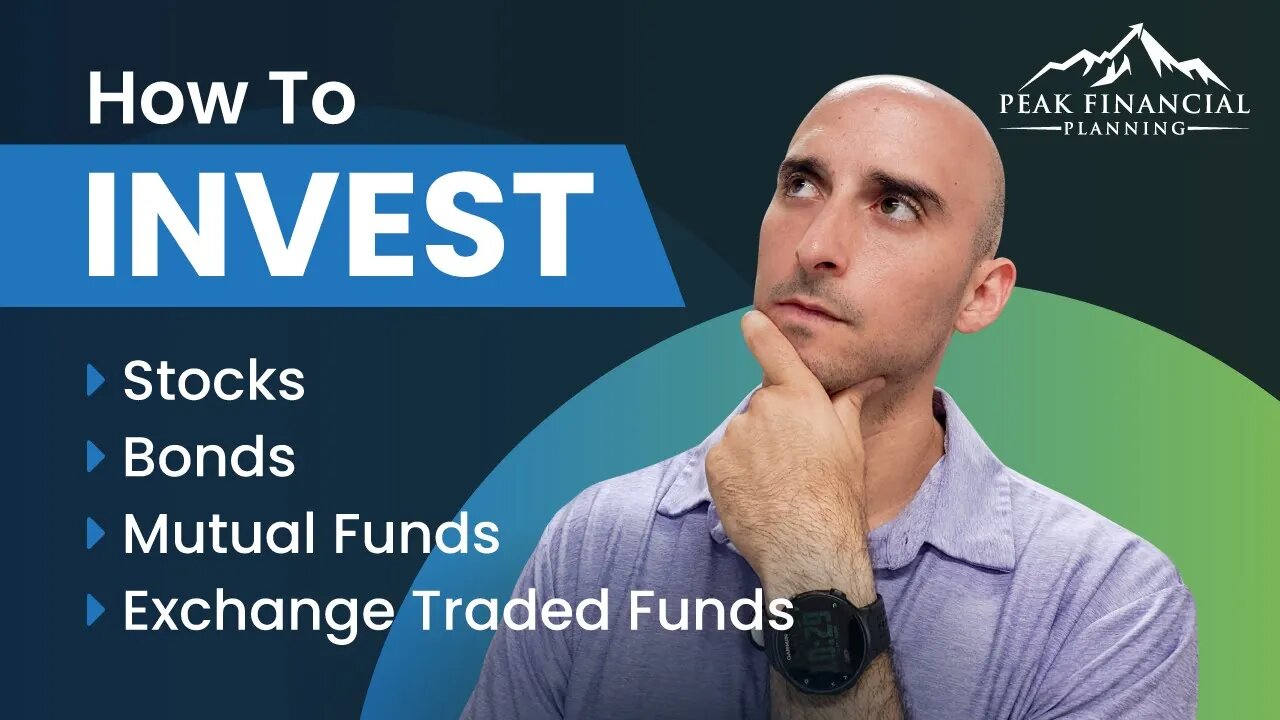Premium Only Content

Beginners Guide to the 4 Most Common Investment Vehicles Financial Advisors Use
Beginners Guide to the 4 Most Common Investment Vehicles Financial Advisors Use
⚒️Resources⚒️
Free Masterclass On How to Increase Income In Retirement By Up To 30%: https://app.thepeakfp.com/free-training
This is part 3 of our basic overview of investing series.
To begin, you must understand that there is a wide universe of types of investments.
Stocks, Bonds, Crypto, CDs, Real Estate, Private Equity, Limited Partnerships, etc.
My opinion is that the array of options is simply to broad to understand them all deeply and therefore paralyzes us into inactivity.
This is where a fee-only fiduciary financial advisor can be a great help - to cut through the clutter and educate you on your options. Studies have shown that high quality financial advisors can increase your retirement income by as much as 30% by helping you focus on 6 key areas of your financial life. If you'd like to learn about this exact strategy, you can watch my free training "How to Increase Your Income in Retirement by Up to 30% and Avoid Running Out of Money In Retirement".
The question of how to invest begins with understanding where we CAN invest, as well as what the most common types of investments available to us are.
Most of us will be investing via our employer sponsored retirement plans - things like 401ks, 403bs, 457s, Simple IRA's, or maybe our own taxable brokerage account.
These account types have the lowest barrier to entry in order to get access to investment markets.
They are highly liquid, simple to use, and a great place to start.
The most common initial types of investments are Stocks and Bonds.
Stocks are ownership in a public company.
Bonds are loans to a government - Federal, state, municipal, or even to private companies.
While both stocks and bonds are easily accessible, the challenge arises in answering the following questions:
1) What do I buy? Which stock/bond?
2) What do I pay? Am I getting a good price or is this a bad time to buy?
3) When do I sell? Will I be making money? Will I be taxed?
4) How do I diversify? How much risk will i take on?
The next type of investments to consider are Mutual Funds.
Mutual Funds are pooled investor money.
A professional investment manager starts a business identifying good companies or bonds that he can wrap together into a portfolio.
They then offer to sell shares in their company to individuals like you or I.
The reason we might invest into a mutual fund rather than the companies or bonds themselves are:
1) It may be too expensive for us to buy every stock or bond that might go into the mutual fund portfolio. We can get access with less funds by investing into the mutual fund.
2) By investing in the mutual fund we delegate the management and research that would go into building our own portfolio. We can use the professional managers expertise so that we do not have to become professional managers ourselves.
Mutual Funds can be great vehicles for individuals who do not have the time or resources to invest into hours of learning about companies.
At the same time, access to them comes at a cost - typically a sales charge that you pay on the front end. The fee might range from 1%-4% of the dollars you invest in that managers fund.
Next up we have Exchange Traded Funds
Exchange Traded Funds function very much like mutual funds. They are traded like stocks - meaning easily accessible.
The exchange traded fund consists of a portfolio of stocks and bonds that are passively managed.
Individual investors can then purchase shares of the ETF, or exchange traded fund, instead of needing to purchase all the stocks or bonds that comprise the portfolio.
Again this requires less cash making it easier for most individuals to access.
The main difference between ETF's and Mutual Funds are:
1) The portfolio is passively managed - ETF's are usually managed according to an algorithm or script.
2) ETF's have MUCH lower fee's associated with them because there is not a full time professional manager dedicated to the portfolio.
The final thing to consider is
Where do I actually invest?
Typically there are 4 broad categories of Investment accounts.
1) Taxable Brokerage Accounts such as Robinhood, Wealthfront, Charles Schwab
2) Employer Sponsored Retirement Accounts such as 401ks, 457's, 403bs
3) Individual Retirement Accounts such as Traditional IRA's, ROTH IRA's.
4) Self Employed Retirement Accounts such as SEP IRA's, Solo 401ks
Within these 4 investment account types will be different varieties of investment options that must be selected from.
Choosing the right accounts can be complex - in some cases you may not want to duplicate account types, or overlap account types.
00:28 The Universe of Possible Investments
1:43 Stocks and Bonds
3:51 Mutual Funds
5:41 Exchange Traded Funds
6:48 Types of Accounts
-
 LIVE
LIVE
Damysus Gaming
1 hour agoBorderlands 3 - Part 8 - FL4K Time | Children of the Vault be Warned!
38 watching -
 LIVE
LIVE
Patriots With Grit
4 hours agoWhat You Should Know: Harmful Vaccine Ingredients | Dr. Bryan Ardis, D.C.
274 watching -
 LIVE
LIVE
This is the Ray Gaming
36 minutes agoSunday Night Live with the Boys | Rumble Premium Creator
48 watching -
 LIVE
LIVE
ItsMossy
1 hour ago🍃NEW MIC WHO THIS🍃DRIVING SIM GO BRRR🍃420 SESH🍃
24 watching -
 LIVE
LIVE
THOUGHTCAST With Jeff D.
55 minutes agoSunday night Fortnite With ScottishVikingGaming & crew
22 watching -
 LIVE
LIVE
a12cat34dog
2 hours agoSOLID DAWG RETURNS :: METAL GEAR SOLID :: 1998 IS UNFORGIVING {18+}
66 watching -
 LIVE
LIVE
yellow_1ron
3 hours agoGAMING WITH THE HOMIES JOIN UP | JOIN!
33 watching -

JohnnyDrop
2 hours agoJOHNNY DROP | Let's get to 100 Followers | Warzone / PGA / Question of the Day
2.73K -
 11:52
11:52
Exploring With Nug
3 hours ago $0.12 earnedWhat’s Hiding Under This Dallas Lake We Found a Vehicle!
21.4K3 -
 LIVE
LIVE
sSK1TTL3Ss
2 hours agoBATTLEPASS Grind!
9 watching